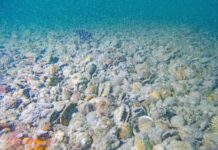The car was impeccably styled, a deep moss-green gloss with matt black facings, compact rather than small, in marked contrast to the growing-by-the-year new models that established manufacturers have pumped into the new car market in recent years.
Then the Quay Street traffic moved on and the mystery beauty disappeared, leaving me on my bar stool outside the beautiful facade of a thriving Britomart pub, the next stage of my own project in the city successfully completed but anxious work remaining to be done. Including writing this editorial as the world literally reeled off its axis.
Whatever took a hit when the post pandemic austerities bit, it wasn’t the new car market, and supersized Toyotas (with that handy reputation for being reliable) dominated the early evening traffic streaming home to the eastern suburbs.
Beyond the red iron fence of the port, the giant MSC Magnifica docked at Queens Wharf revealed the source of the evening’s crowds. More elegant than most in her styling but so very, very large, she brought to mind echoes of the Hindenburg and the Titanic, which signalled the frenzied end-days for the mayfly privileged classes before the imminent dark of war.
In truth, we have been on borrowed time for three decades. Centralisation, debt, slavish GDP goals and market forces exerting a stranglehold on the fruits of the western world’s labour and the whole planet’s natural resources. All the wealth that has now aggregated to a handful of dodgy tech titans and more malignant oligarchies than we ever saw coming.
Unsayable narratives are being swept away.
The tectonic shift in geopolitics peaked over the weekend and we are left asking ourselves if any nation has ever squandered its diplomatic capital, plundered its own political system, attacked its partners and weakened its own position with implacable rivals as rapidly and brazenly as Donald Trump’s America?
“Political power boils down to two things: votes and money. But when money buys presidents, senators and judges, votes are merely the sales receipts. What’s left is money, and the purpose of power is to get more of it,” Brooklyn journalist Judith Levine said in the Guardian this week.
“Trump’s non-billionaire followers appear thrilled that Elon Musk and his so-called “department of government efficiency” are burning down the government.
“What the megalomaniacal multibillionaire is destroying is everything – minus the policing functions, of course – that we pay taxes for, including such frivolous agendas as food inspection, flood mitigation and Medicare. This is how kleptocracies work. Taxes are collected from the hoi polloi.
“The more benign government functions – housing the poor, postponing climate apocalypse – are abolished. But the rest of these functions do not entirely disappear. Rather, they are farmed out to private enterprise, which undertakes what it’s paid to do with minimum expense and maximum profit (and we all know corporations never commit waste, fraud or abuse).”
And we should know. The (American) textbook was tested here in the 1980s and inequality and stagnant wages swiftly followed.
In this week’s Listener cover story Paradise Lost, Danyl McLauchlan sets out what was hiding in plain sight; that New Zealand’s potential has been squandered by short term thinking, top-down governance and weak economic policies.
By design, of course.
As Labour Finance Minister Roger Douglas said in his 1989 book Unfinished Business: “The government should move quicky so that citizens had no time to mobilise against the major structural changes begun in 1984.”
And it did.
New Zealand was once one of the world’s most prosperous countries, McLauchlan said.
“During the post war era, we had one of the highest per capita incomes in the world: higher than the UK and the rest of Western Europe.
“A cradle-to-grave welfare system delivered longer life expectancies and near-zero unemployment. When we congratulated ourselves on being the best country in the world for a child to grow up in, there was a wealth of evidence to prove it.”
Now, we have ambulance-at-the-bottom -of-the-cliff school lunches and the government is replacing functioning community initiatives with three-dollar packs of processed food.
Our powerful unitary government has few checks and balances and nearly all of the power sitting with the executive – government ministers and the heads of state services; a climate in which governments can act impulsively and with little accountability, degrading the quality of legislation. Former prime minister Sir Geoffrey Palmer has said it for years.
Reviewing the political actors and “relentlessly operational” executives over the years, yes it was often shameful. And yes, liberal democracies are not supposed to work like that. They can’t. Not if you sell the means of production, unwind the infrastructure that gets produce to market and bundle all the taxes onto a debt-ridden workforce.
There is something too Old Testament, too punishing, about living in paradise but not feeding hungry children. Communities, genuinely resourced, regulated and actively making decisions for their particular slice of paradise built a great country. For a while the greatest, for its citizens. Small was dazzlingly workable.
We are in a new and frightening arena. Crisis or opportunity will be there for the taking.
As the 7.15pm ferry left the docks behind, a brilliant sun burnt a path down the harbour, blazing golden around the western cloudforms and stabbing the retreating ferry travellers, Rangitoto a strange, dark presence to the north. The planet at its mesmerising best.
• Liz Waters
© Waiheke Gulf News Ltd 2025






